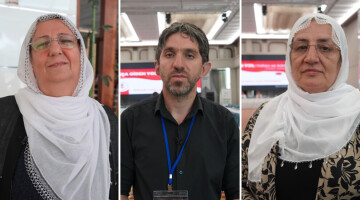At the beginning of July, Attorney General Peter Frank visited Turkey. At the invitation of the Turkish Attorney General Bekir Şahin, the Attorney General met with regime leader Recep Tayyip Erdoğan, the Attorney General, the President of the Turkish Court of Cassation Mehmet Akarca and the Turkish Minister of Justice Bekir Bozdağ. The secret friendly visit to these officials, who are responsible for the merciless persecution of all opposition, and the Turkish dictator took place directly after Erdoğan had given up his blockade position on Finland's NATO accession for the time being. The visit, published by the Frankfurter Rundschau, gave rise to speculation about the content of the meetings, particularly because of the timing.
German government silent on content of meeting
Gökay Akbulut, the migration policy spokesperson of the Left Party, therefore questioned the federal government. The government, however, remained silent on the content of the meeting, stating that no "concrete criminal proceedings" had been discussed and that the government would not comment on the content of "confidential meetings with international interlocutors".
Almost 70,000 criminal messages sent to Turkey
Nevertheless, the answer of the Federal Government revealed some shocking facts about the cooperation with the regime in Ankara. For example, it became clear that the Federal Government forwards all convictions of Turkish citizens in Germany to the Turkish Ministry of Justice. This involves tens of thousands of data records, with an upward trend. In 2017, 47,779 so-called criminal records were transmitted to Turkey, which was 57,531 in 2019 and 69,790 in 2021.
The Federal Government does not see any need for action with regard to the protection of the persons concerned in case of entry into Turkey. This applies in particular to people who have been convicted of violating the law on associations (PKK ban), as only the general offence and not the "association" is entered in the forms. In this way, the federal government disregards the fact that almost all convictions for "violations of the law on associations" in Germany are reprisals against the background of the PKK ban. The AKP/MHP regime is probably more than aware of this fact. The persecution of those concerned seems to be of little interest to the federal government, which says that there are "no findings" in this regard. Turkish citizens are regularly arrested when entering the country from Germany. Whether the criminal records also play a role in this, the federal government obviously does not want to disclose.
At least 48 extradition requests by Turkey
When confronted with the figures of the newspaper "Yeni Şafak", according to which a list of 129 persons with a request for extradition had been handed over to the Federal Public Prosecutor, the Federal Government answered evasively and explained that there were no extradition statistics for the year 2022 yet, but as of 19 July the number of 48 had been determined. However, the Federal Government had no knowledge of the charges against the persons whose extradition had been requested.














